Scientific Tutorials
With an emphasis on enhancing learning through didactic presentations, ISAC welcomes the submission of tutorial proposals for CYTO 2026 from researchers, shared laboratory personnel, professors, and/or practitioners in all settings to offer expertise to the cytometry profession. The scientific tutorial consists of a didactic lecture by one or more individuals about a relatively well-established or emerging topic and is provided by expert leaders in the field. While discussions with participants are allowed, the focus of the tutorial is to disseminate established, consensus information to the cytometry community. All tutorial proposals will be assessed and scored by multiple reviewers by the ISAC Education and CYTO Organizing Committees.
Scientific Tutorials will be 75-minute parallel scheduled sessions in 3 blocks on Saturday, June 6th at CYTO. Tutorials are intended to provide CYTO attendees with an expert-led lecture to understand cytometry-related subject matter. Tutorial proposals should have an emphasis on well-established consensus best practices or review of a field for the life-long learners of our society.
IMPORTANT DEADLINES:
- Submission site opens: October 6, 2025
- Proposal Submission Deadline: Closed
- Notified of Acceptance: January 2026
Ideal Tutorial Proposals
The Society solicits proposals that:- Clearly articulate a focused topic relevant to research, methodologies, best practices, or core operations in cytometry.
- Review fundamental concepts or provide practical guidance on the implementation of consensus or widely adopted practices.
- Introduce foundational principles for newer or emerging areas within the cytometry field.
- Emphasize clarity and reliability over speculation, focusing on well-established or evidence-based approaches.
- Provide innovative, compelling content across all learning levels: basic, intermediate, and advanced level proposals are all welcome and encouraged.
Scientific Tutorials are parallel scheduled sessions in three blocks on the first day of CYTO. Tutorials are presented in the absence of other presentations such as workshops, parallel sessions, or plenaries. Members from all areas of cytometry — Industry, Shared Resource Labs, and Institutions doing basic, translational, and clinical research — are encouraged to submit proposals for tutorials.
Preparing for Your Online Submission
The Society uses an online submission system for proposals. For a proposal to be considered, submissions will only be accepted through the online submission site, must contain all the required elements, and be completed by the deadline. The following information is required for submission:
- One Lead Presenter, Affiliation, and Brief Biography
- Tutorial Title
- Intended audience (Core Directors, Scientists, SRL staff, etc., and level--including Beginner, Intermediate or Advanced)
- Emphasize clarity and reliability over speculation, focusing on well-established or evidence-based approaches.
- Tutorial Summary with Learning Objectives (3-5)
To help develop a relevant and engaging set of tutorials that cover the scientific breadth of interests represented within the ISAC community, the tutorial reviewers will use the following guidelines when selecting proposals for inclusion in the congress program:
- Subject should be clearly defined and generally established within the cytometry community.
- Intended audience should be clearly defined (i.e: new members/learners, scientists, engineers, clinicians, industry, SRL staff, core directors, etc.), and an estimate of likely group size included.
- The Name(s) of any proposed presenter or panel members should be included.
- Emphasize clarity and reliability over speculation, focusing on well-established or evidence-based approaches.
- A list of 3-5 learning objectives used to set expectations for attendees.
Submission Guidelines
To be considered, submissions will only be accepted through the online submission site, must contain all the required elements, follow the guidelines below, and be completed by the deadline.
- Tutorial proposals must be submitted in English.
- Please make sure that your browser can display the full variety of special characters, including Greek letters, if needed for your proposal.
- Each submission must designate one Lead Presenter and may include up to four co-presenters.
- Emphasize clarity and reliability over speculation, focusing on well-established or evidence-based approaches.
- Proofread your submission carefully to ensure the content and presenter's information is correct. We suggest you "Save As Draft" and carefully proofread all information before submitting.
- Submission changes and edits can only be made prior to official submission.
- Once submitted, you will not be able to make any further changes.
Submitter: The individual submitting the tutorial through the submission portal.
Lead Presenter: The primary contact with ISAC staff
and the Education Committee, who will lead the tutorial at the
conference, make final decisions on content, approve all
co-presenters, and receive all communication regarding the session.
The expectation is the lead presenter must be available to present
the tutorial on the scheduled day and time at CYTO.
*Please note each submission is limited to one lead presenter and
four co-presenters
Contributing Authors: All authors associated with the submission, including the lead presenter and any additional contributing authors.
Accepted proposals will be published online exactly as they are submitted. After your request has been submitted, a confirmation email will be sent to the submitter's email address. The email is for your records only and does not constitute the request has been approved. If your tutorial is approved, an official acceptance email will be sent on December 22, 2025. If you do not receive an email within 24 hours, please email cyto2026speakers@maritz.com.
Please Note:- Final choice of Tutorial topics will be determined based on the quality of proposals, expected interest, and overall balance of the Congress program.
- The Education Committee reserves the right to decline a submission that lacks scientific content or merit, or that merely announces the availability of a resource or service.
- Tutorial proposals should clearly describe the projected learning outcomes of the presentation.
